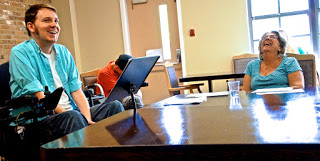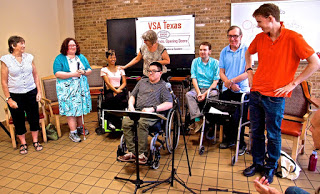A Tale of Two Showcases, Part 1
(Photos by Camille Wheeler)
I have a bad habit of doing things backwards. In college, I completed my freshman composition requirements as a super senior. I moved to Austin before I had a job or even a place to live. Most recently, I completed an OMOD class as a student after having led several OMOD classes. Now I would not advise anyone else to do these things in the same order I did, but for me, the reverse order seemed fortuitous. After waiting ‘til my final semester to fulfill the composition requirement, UC Berkeley offered a “Disability in Film” class for the first time since I started school there, and that class gave me the opportunity to sink my teeth into material I truly cared about. Moving to Austin without a plan allowed me to find a unique organization that I literally rolled into one day not knowing it was the start of a powerful four-year journey into the world of self-advocacy and a kind of storytelling I never thought imaginable.
Similarly, if I had taken the OMOD class when I first began this job, I would have been so caught up in my post-college ego that I would have hardly learned a thing. Taking the class also came at a time when changes in my disability forced me to accept dictation as my new permanent way of writing. While I resisted this change as long as I possibly could because of how restrictive I imagined it, I realize now that dictation – and this whole class, for that matter – allowed me to break free of what always scared me most about writing: revision. Since writing without a mistake is virtually impossible through dictation, I learned to let the mistakes go, to accept the crappy first draft, to see a story as more than the nuts and bolts that hold it together.
Of course, the OMOD class experience was far from being one man’s stubborn battle with Dragon Dictate, and I must mention Chris Strickling, our rock star facilitator, and the OMOD process itself, which is almost magical in its transformative power. Chris has the uncanny ability to cut to the heart of a story, and she always seems to say exactly what a writer needs to hear. One five-minute conversation with Chris caused me to rethink my use of verbs entirely, and I have had verbs on my mind ever since. I realized that my verb vocabulary has not grown an iota in the last four years, so I most certainly have my work cut out for me in the coming months!

Chris laughs while I present my story in class.
Beyond Chris, working in a class with seven peers with a range of disabilities and all in the same nerve-racking boat of writing and presenting personal stories instilled camaraderie, confidence, and a true revelation of what is good in a story. Unlike any creative writing class in college where feedback is either presented in cold online forums or shared around a circular table where you are asked to sit quietly while your peers report back on what they thought about your story for a grade, OMOD allows you to see the effect of your story on the actual faces of your peers as they hear it for the first time, to experience the thrill of their genuine laughter at humorous moments in your story or their heartfelt response when you reveal a part of yourself just like them.
The OMOD class culminated in a showcase for an audience of 40 people that resulted in a (well deserved, in my opinion) standing ovation. We began with an ensemble piece entitled, “Listen to My World,” in which we all described the sounds we hear or the images we see, if hearing is not possible, and what those sounds or images mean to us; Carlos Orellana closed the showcase with a beautiful piece showing that these sounds can actually present a complete picture of who we are and left us with the line, “It’s not the footrests, the brakes, or the wheels that make the wheelchair, it’s the person inside,” to which we answered, “It’s always the person inside!”

The OMOD crew! From left to right: Sheri, Jennifer, Nissi,
Chris, Carlos, me, Michael, and Peter

